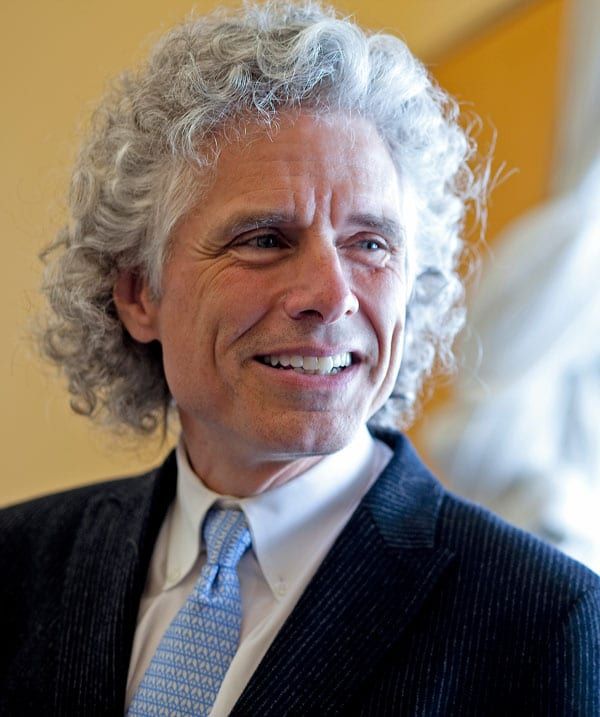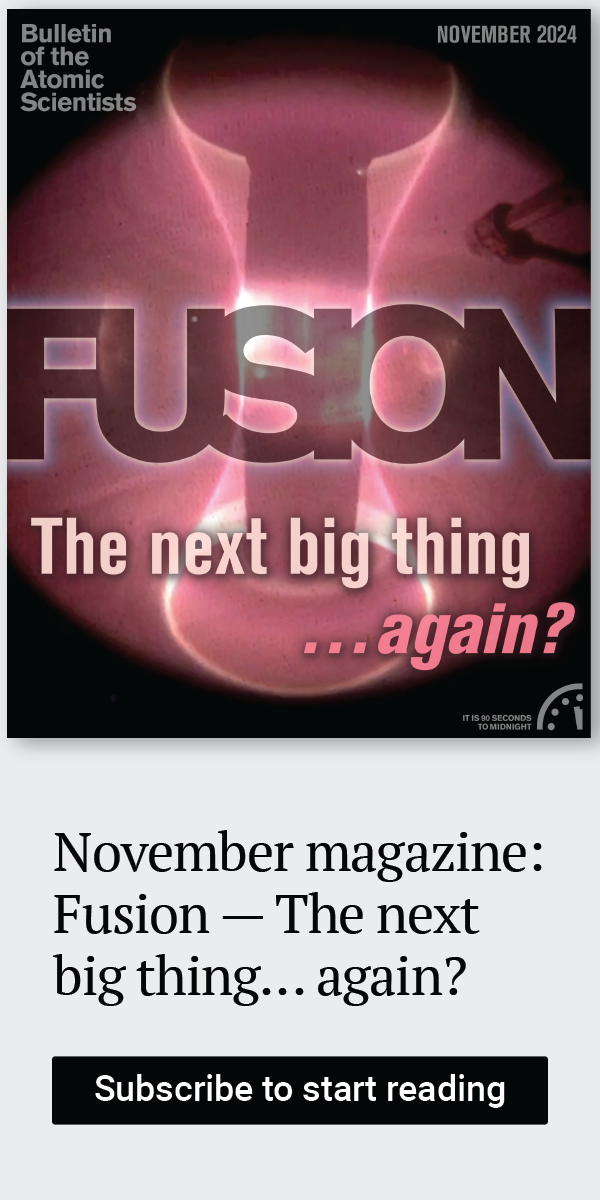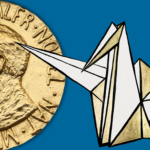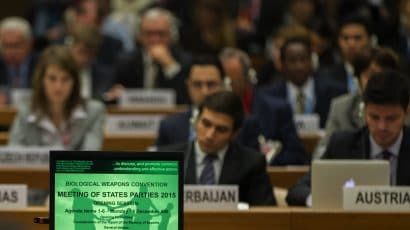It’s easy, surveying the world, to conclude that human life is dominated by poverty, disease, oppression, violence, and other ills. Such a viewpoint, according to experimental psychologist Steven Pinker, is deeply misguided. Pinker, who has become well-known far outside experimental psychology thanks to a series of best-selling books such as The Language Instinct and The Blank Slate, argues that human beings are better off today than they have ever been. Moreover, further progress can be expected as long as humanity, following a path laid during the Enlightenment, continues to use reason and science to solve its own problems. In this interview, Pinker amplifies the ideas that underlie his new book, Enlightenment Now, but also assesses the risks—nuclear war and climate change—that most imperil human progress.
Bulletin: Let me start by saying that I’m strongly persuaded by the argument that forms the main thesis of your new book, Enlightenment Now. But for the benefit of Bulletin readers who haven’t read it or heard about it, I wonder if we could start with a brief synopsis of what you argue.
Steven Pinker: Sure. The core of the book tries to document the reality of progress by plotting the major indicators of human well-being, including longevity, education, affluence, leisure time, and richness of experience, and shows that all of them have increased over time—contrary to the fatalistic, pessimistic view of the world that one can get from reading the news, which concentrates on salient negative events, as opposed to gradually improving trends. I should have added to the [above] list safety from accidents, safety from personal violence, and risk of death in war.
[The book] then asks why these improvements have occurred. And since the book does not advocate any mysterious arc of progress that lifts us ever higher, it identifies the causes in the values of the Enlightenment, mainly the use of reason and science to improve human well-being. Overall, it’s a defense of the Enlightenment values, primarily reason, science, humanism, and progress.
Bulletin: Excellent. Now as I said, I find the argument strongly persuasive. At the same time, you’ve made some pretty strong statements about the Bulletin‘s Doomsday Clock.
Pinker: Oh, yes.
Bulletin: You called it a “propaganda stunt” in your new book and a “fear-mongering gimmick” on Twitter. Now, not everyone has to agree on the value of the Doomsday Clock, but still I’d be remiss if I didn’t ask you a couple of questions on that topic.
Pinker: By the way, I should preface [this] by saying that I am in complete solidarity with the goals of the Bulletin of making the world more aware of the danger of nuclear war and in agitating toward increased stability and eventual elimination of nuclear weapons. I’m completely in sympathy [with] those goals.
Bulletin: I suspect that, by the time we finish this conversation, it will turn out we’re less in disagreement than one might have suspected to begin with—but nonetheless. One could get the impression from reading the chapter in your book on existential threats that people these days are so overloaded with overhyped warnings about catastrophe that they are likely to ignore such warnings completely. My view is that most people pay virtually no attention to the risk of nuclear war, unless something specific in the news forces them to think about it, which it usually doesn’t.
So, once a year, the Doomsday Clock might cut through and make people think about the admittedly unlikely but still very real possibility that nuclear war could kill millions, or even billions, of people. And at least in an indirect way, the result might be a reduction in risk. Cast that way, would you still describe the Doomsday Clock as a propaganda stunt or fear-mongering gimmick?
Pinker: Well, I completely endorse the goal of making the populace more aware of the very real threat. My question is whether the Clock itself is the most effective communication technique. My reservations about the Clock are, really, threefold.
One of them is that the causal mechanism that the Clock embodies is misleading, in that there is a non-zero risk of nuclear war but it’s not as if there is a finite amount of time after which catastrophe is guaranteed, which is what a clock would connote. The second is that it doesn’t track indicators of the actual risk. It seems to reflect just how much the Bulletin wants to scare people. It’s not keyed to indicators of the objective threat. And then the third was the expansion, I think it was in ’07, to climate change. It’s not even an indicator of the original risk of nuclear war per se, but seems to be more of a dread-generating device.
That having [been] said, I do feel somewhat uncomfortable in criticizing it, given how much I agree with the moral imperative and with the underlying presumption that the world doesn’t give enough attention to the issue, and [how much I agree] with anything that makes people more motivated to reduce the risk. The fear is that if the awareness consists only of dread and numbness and paralysis, [the Clock] would not have achieved its aim.
So another measure that I would call for is perhaps more collaboration with psychologists, people in my field—or maybe it should be [with] people in marketing and advertising and persuasion—as to what kind of communication would actually move the needle in terms of making the threat of nuclear war a live issue.
The fact that far more attention is given to terrorism and rampage shooters than to the threat of nuclear war is a symptom of the problem. My fear is that people would be paralyzed into inaction, where they just hope the experts are wrong, feeling that there is absolutely nothing that could be done and that we are doomed—that it is doomsday, that [the Clock’s] hands will inexorably tick toward midnight. That model seems to minimize the chance that human agency can do anything about the problem.
Bulletin: In your book you write about a lot of other dangers—many of them, I would agree, are completely overhyped. There are so many people warning about so many crises and so many varieties of doom that it can be frustrating for people in the disarmament community to figure out how to cut through and make people pay attention to the one technology that actually could destroy, or all but destroy, the world. So if people in the world of psychology or marketing could solve that problem for disarmament types, they would be happy.
Pinker: So we do agree. [P]eople ask me [if] I think that everything is getting better. “What would be the counterexamples to progress? What are the things that I’m concerned with?” I would certainly list the possibility of nuclear war as the prime danger, together with climate change. It’s not that I minimize, by any means, the threat of climate change, because I think that, together with nuclear war, it is the biggest risk to continuing progress.
I guess there’s a small disagreement over tactics and messaging, rather than any kind of disagreement over goals and assessment of risk.
Bulletin: I see. That somewhat preempts my next question—because in the section of [the] chapter on existential risks that dealt with nuclear weapons, you laid out a series of steps that we ought to take to reduce this danger. I was going to just comment that these steps, such as reducing arsenal sizes, adopting no-first-use policies, and eliminating launch-on-warning alert status, are exactly the sorts of things that the Bulletin also advocates for, and many others in the disarmament committee do too.
Pinker: That does not surprise me because that was exactly that work that inspired me, that gave me the idea. It’s not a coincidence. And I find those arguments persuasive.
I guess one question would be—and this is as much a question for the people who read and write for the Bulletin as a statement—would people be less fatalistic and more engaged if they were more aware of the progress that has taken place, at least in reducing arsenal size and in [agreeing to] treaties like New START, than if they were unaware of them and under the impression that no progress has been made at all? That’s actually a question, by the way, that I hope to study myself empirically because none of us has enough clairvoyance to know the answer without doing some testing of real live human beings.
I think it’s a question worth asking and I, at least speaking for myself, for whatever that’s worth, I felt more energized to publicize the issue after I became aware that progress had been made in reducing nuclear arsenals and in slowing proliferation. To say nothing of the fact that—and I think [this is] not appreciated nearly enough—whether by luck or design, or by both, no nuclear weapon has been used in warfare since Nagasaki. Again, not a reason to be complacent, but a reason for encouragement that we’re not doomed. I fear that a resignation that we’re doomed could be self-fulfilling if it reduces the imperative to improve nuclear safety and advance the world toward disarmament.
In my previous book, The Better Angels of Our Nature, I go into the Global Zero movement, and I don’t know if the Bulletin advocates Global Zero, but I do discuss it as a nonutopian possibility. And I mention it again in this book, that [disarmament is] not [going to] happen in our lifetimes, but nor do I think that it is a hopeless long-term cause.
Bulletin: You set out a very persuasive vision of the way it could happen. The idea that nuclear weapons could be reduced to the point that they were strictly serving a—well, they’re strictly serving a deterrence capability these days, you could already say. But if they got [further] reduced in number, [if the ongoing trend away from interstate war continued], and [if] the utility [of nuclear weapons were] perceived more and more as strictly deterrence, at some point they could deter themselves right out of a job and people might say, “Well, what do we need with these things anymore?” That sounds plausible. Though I don’t know how long it will take.
Pinker: Right.
Bulletin: Okay, very good. To return to what you said a moment ago about whether people would be more inspired to do something about disarmament if they knew that progress had been made and they didn’t feel that doom was inevitable—that might be true, but then again, you sometimes encounter the reality that young people barely even know that nuclear weapons exist. They didn’t grow up in the Cold War, [when nuclear weapons] were spoken about all the time. They think that [nuclear weapons are] just gone, which is very far from the truth. I guess you’d have to find out how to reach different audiences at the same time.
Pinker: True enough. Yes.
Bulletin: Let’s move on, then, to issues that aren’t specifically nuclear. Now, as I said, you argue persuasively that human life has gotten much, much better over the centuries. But something that I kept feeling as I read the book is that this argument is easier to appreciate when you already enjoy relative comfort in life, as I imagine you do, and as I do. It takes a certain degree of leisure to appreciate progress achieved over centuries, or to applaud the improved living conditions of people you’ll never even meet.
So let me ask this rather speculative question. If Enlightenment ideals continue to spread and human well-being continues to improve, do you suppose that the ability to appreciate progress will also grow? Or [are] a certain amount of pessimism and some misguided nostalgia for an imagined past just baked into our nature?
Pinker: Yes. Good question. I think it is baked into our nature. That’s one of the reasons that people often fail to appreciate the accomplishments of the Enlightenment. We pocket our good fortune and find new things to get upset about. I think it should be part of the education of any literate person to be aware of what life was like in the past. And to be aware of what life is like in less fortunate parts of the world.
If education concentrates only on the unsolved problems, and only on the various injustices and grievances that remain, then we can become ungrateful and unappreciative of the gift of liberal democracy, of well-functioning markets, of a regime of international cooperation—all of which should not be taken for granted. We know that in some countries they can corrode and be demolished and that, even in our own society, we know that a dystopian picture of the world, often uninformed by data, can open the door to demagogues—like our current president, who very much campaigned on a dystopian narrative, culminating in his infamous inaugural address. And because of a lack of appreciation of how far we’ve come, even his opposite number in the Democratic Party couldn’t present a constructive narrative of the progress that society has enjoyed, [which] kind of left the field open to people who are so cynical about progress that they agreed that a radical change could only be an improvement.
And I’m sorry, that was a long way to answer the question, [but] we very much could be in danger of failing to appreciate progress, for exactly the reasons you mentioned.
Bulletin: This might be a naïve thought, but to the limited extent that most people know history, they know the great events and the great men. And that doesn’t tell you very much about how truly miserable human life was for so many people, throughout history.
Pinker: I couldn’t agree more. I agree with you that history—the teaching of history should be recalibrated to present what life used to be like. Some of that would require not just a focus on cataclysmic events but on gradual changes.
Bulletin: You devote entire chapters in your book to facets of human life that have improved: longevity, health, prosperity, and a bunch of others. You also discuss a few problems that are real and hard to solve, like climate change and, again, the risk of nuclear war. But when you look around the world, do you see much that, as far as you’re concerned, is demonstrably getting worse?
Pinker: Social trust is declining, and confidence in institutions such as democracy, rule of law, science, [and] the press. Lack of social trust is a risk factor for unhappiness—and also militates against a sound economy because social trust provides many economic benefits, as well as benefits in quality of life.
Bulletin: Where does that spring from and how do you fix it?
Pinker: Good question. Some of it springs from an increasingly aggressive and cynical press that devotes so much attention to failures, problems, and crises that it can give a misleading impression about how dysfunctional society is. [C]rises are described as they pop up, but resolutions of crises rarely are. Gradual developments—such as the decline of deaths in warfare, the decline of global poverty, the rise in education—receive virtually no coverage. So it’s easy to come away from the news with a feeling that every aspect of society is in deepening crisis.
I’ll give one example. [T]he media frenzy in the late 1980s about the barge filled with New York garbage that could not find a landfill anywhere along the Atlantic coast that [would] accept it led to the impression that the country is facing a solid waste crisis. And that we’re running out of space to put our solid waste. Whereas the reality is [that] there are plenty of landfills. They’re environmentally pretty sound. There were rarely any stories following up to say “This is one thing that [we] should not lose a great deal of sleep over.”
Bulletin: Right. It’s understandable that the media reports on the plane that crashes instead of the thousands that don’t crash, but nonetheless, you end up with an inaccurate impression of air travel. And the same is true for many, many topics.
You say more than once in the book that progressives hate progress. Can I persuade you to psychologize that tendency, and perhaps the conservative tendency always to think that the world is being corrupted?
Pinker: I think there are several psychological phenomena in play here. One of them is our negativity bias—our loss aversion, as [psychologist] Daniel Kahneman calls it. [W]e dwell more on what can go wrong than on what can go right. We consider it to be wise and prudent to dwell on the crises and naïve and complacent to appreciate the improvements. There’s also a certain amount of professional one-upmanship and rivalry among different elite guilds to disparage the state of the world. It’s a way for academics to look down on businessmen, and businessmen to look down on politicians. Among many intellectuals—probably accelerating in the 1960s—there was a feeling that to be a responsible intellectual you had to point out everything that was going wrong with society and stand in opposition to the institutions of liberal democracy.
Bulletin: But this tendency extends beyond the academy and the professional classes. I’d say it’s just as powerful among ordinary people, to the extent that they pay attention to politics at all.
Pinker: Indeed. And I think [it is due to] the negativity bias, together with the availability heuristic—again, a discovery of Daniel Kahneman, together with [late psychologist] Amos Tversky, that our assessment of probability is driven by available examples from memory. And that we have much more trouble calibrating our memory of particular events by the number of opportunities there are for the events to occur. We don’t naturally calculate probabilities in our head in terms of number of occurrences divided by number of opportunities. We simply go by number of occurrences that pop into mind. And because the bad news and the good news occur on different timescales, something bad can happen instantaneously whereas most good things aren’t built in a day. And the fact that our attentions are more captured by the disasters than by the gradual improvements—we can get a miscalibrated impression of how much things have improved.
And again, I want to emphasize that it is simultaneously possible that all the indicators of day-to-day life can improve while [the threat of] low-probability but catastrophic-impact [events remains]. And so I want to emphasize again how much I am in solidarity with the aims of the Bulletin in making people aware of that risk, even as the indicators of day-to-day well-being continue to improve.
Editor’s note: Bulletin president Rachel Bronson has written a response to this interview. It can be found here.
















